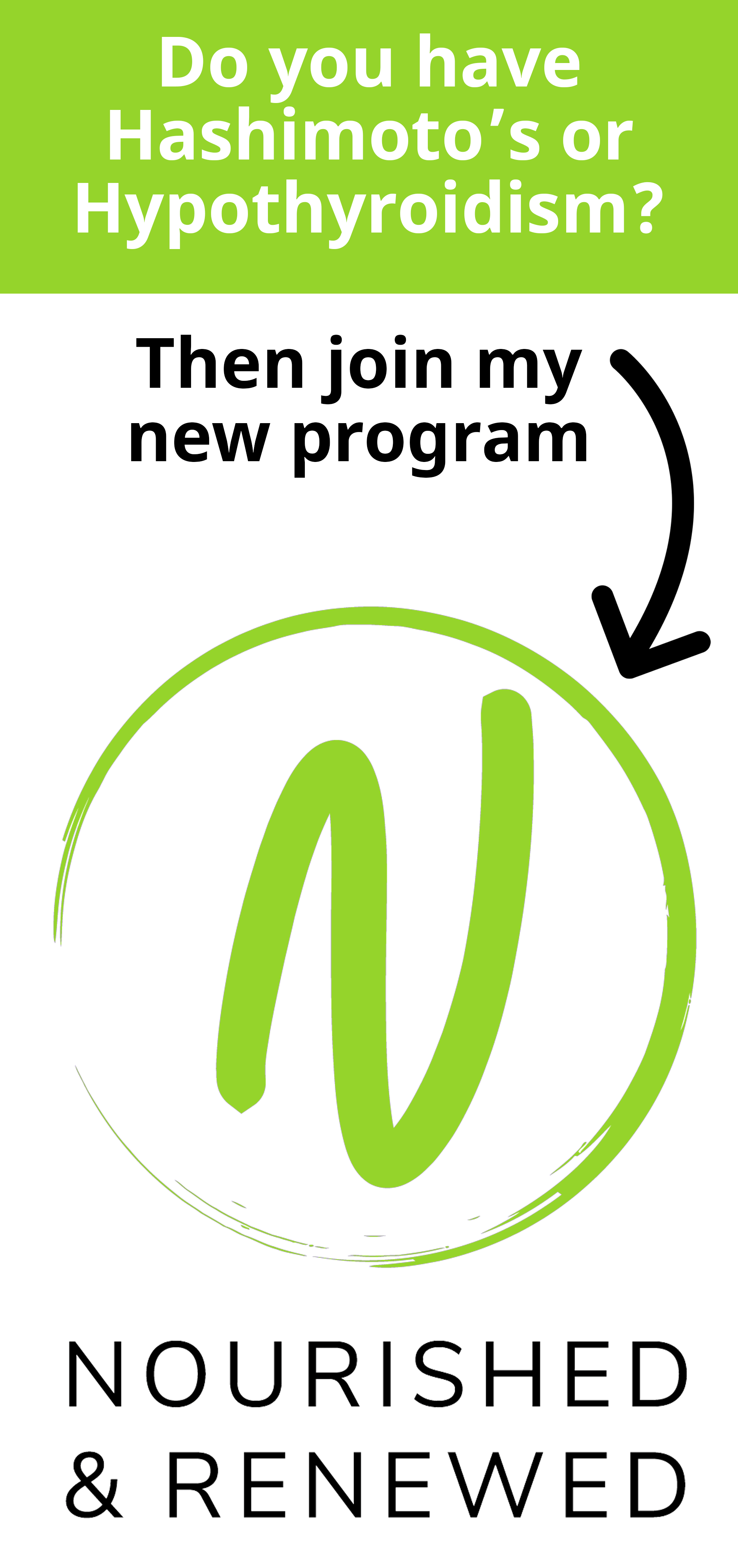First, What Do Genes Have to Do With Health?
I have been working on writing this for some time now. I am super excited about the subject of genes and health (and Hashimoto’s!).
And, this post will be part one of two. There is a lot to say about genetics!
Before we get into the relationship of genetics and Hashimoto’s, I want to explain some general information about genes.
A gene is the basic physical and functional unit of heredity.
Genes are made up of DNA.
Every person has two copies of each gene, one inherited from each parent.
Most genes we get from our parents are copies that work the same way they do in our parents.
Have you noticed how you probably look, talk, act or think similar to someone in your family?
Cool, huh?
But, this also means that if a parent has a particular disorder related to their gene, there is a chance that disorder may have been passed on to us.

Our Inherited Genes are Not Always Perfect
Changes in genes are called mutations, and everyone has some.
Some mutations make the gene work better than the original, and many mutations make no difference at all.
Some mutations cause problems.
A condition that is caused by mutations in one or more genes is called a genetic disorder. There is a group of rare diseases caused by mutations in one gene at a time.
But, most common diseases are caused by a combination of gene changes, lifestyle choices, and the environment.
Mutations can be inherited from a parent to a child (“hereditary”) or they can happen during a person’s lifetime (“acquired”).
Most common diseases are a result of both your genes and your environment.
Your environment can include personal choices, such as what foods you eat and how much you exercise, and external factors, such as stress, clean water, and air quality.
Only a small number of diseases are a result of just a single mutation in a gene.
Most diseases, especially common diseases, are a combination of your genetic risk and your environment.

What is Nutrigenomics?
OK, so we have learned some basics about genetics.
Next - the influence of nutrition on our genes.
The “genome” is also known as the complete set of cellular DNA, and where the body finds instructions to build health. The DNA remains fixed for life.
The “epigenome” is also known as a multitude of chemical compounds that can tell the genome what to do. It is this component of the genetic code which remains flexible.
“Nutrigenomics” is the study of how foods affect our epigenetics, as well as how epigenetic differences affect the way we respond to food.
Nutrition has an epigenetic effect on our DNA. In other words, food can alter the way our DNA works.
Nutritional therapy is one of the major ways we can change the destiny of our genetic healthy history and reverse disease in our individual lives.
This area of human science is particularly interesting to me. And, with two kids of my own, I am further amazed by how genetics can play a role in their own development.
Years ago, I ordered the 23andme.com genetic test kits for myself, my kids and my husband.
I learned a lot about my own genetic profile, as well as what might potentially (and I say potentially because genes do not necessarily mean a disease WILL occur) impact my kids.
It was also very interesting to see my husband’s genetic profile while also knowing his family and what types of conditions are present.
I began my own study of genetics long before the field of nutrigenomics was a “thing.”

My Biological History of Gene Mutation and Hashimoto's
Why is all of this genetic stuff just so interesting to me?
Well, when I was just a couple weeks old, I was adopted by my loving parents.
I have always known I am adopted and it has been a very special part of who I am, even today.
In the 1970s, adoptions were “closed” meaning adoptive families did not get a lot of information about the biological history of their new baby. And, adoptees from this time period typically must seek access to records through legal channels.
All we know was that my biological parents were young, and not ready for a family. My birth father was blond, my birth mother a brunette. Their collective nationality was German/Irish.
That is what my parents were told.
My parents were not informed if there was any family history of cancer, heart disease, digestive illness, autoimmune conditions, thyroid dysfunction, infertility or anything else.
Throughout my life, my physiology has been a mystery. Who do I look like? Whose traits have I inherited? Whose diseases might I have acquired?
For example, I lived 30 years of my life not knowing I had Celiac disease, a digestive autoimmune condition with a strong genetic component.
Without access to biological family medical records, this was impossible to connect sooner, and instead was finally diagnosed based on decades of symptoms.
In addition, I developed Hashimoto’s disease, a secondary autoimmune illness – probably as a result of the undiagnosed Celiac disease, gut damage and immune system dysregulation.
So, based on that, I can assume autoimmunity is clearly somewhere in my biological family history.

Are There Genes Responsible for Hashimoto’s?
OK, so now to the big question. Are there genes responsible for the development of Hashimoto’s?
And the answer.
Nope.
There isn’t a gene that has been identified as solely causing Hashimoto’s.
Instead, there are a number of genes that have been “associated” with the development of thyroid disorders.
Associated means that although the genes have been identified, they have not been proven to be the singular cause of a disease.
When referring to these genes, you might think of them as “susceptibility genes.” There are, in fact, a variety of combinations of genes likely make an individual more susceptible to developing thyroid disorders, including Hashimoto’s.
We know that most genes – including the ones that have been seen in people with Hashimoto’s – can be “expressed” differently in different people.
So, even if you have one or more of the susceptibility genes, that won’t necessarily mean you will be diagnosed with a thyroid problem.
The same goes for close family members. While they may share in one or more of these genes, whether or not they are at an increased risk will depend on how each of these genes is uniquely expressed.
New genes associated are always being identified in research, discovering new influences on susceptibility for various diseases, including Hashimoto’s.
Research does show a higher incidence of Hashimoto’s disease in families. That is because Hashimoto’s susceptibility genes can be passed onto children.
It’s no surprise that many clients I work with describe to me their family history which usually includes a number of first-degree relatives who have thyroid conditions - varying from Hashimoto’s to Gravest to thyroid cancer.
Three Requirements for Autoimmunity
Research tells us there are 3 requirements that must be present for an autoimmune disease to develop or be sustained:
- Genetic predisposition
- Environmental factors that impact how that genetic predisposition may be expressed
- Intestinal permeability
So, the interesting thing is that genetics do play a role in the development of Hashimoto’s, but so do other factors.
Genetics are only one of the predictive factors in the development of autoimmune illness and Hashimoto’s.
What is the MTHFR Gene?
For part one of this blog post, the gene I would like to share with you about is the MTHFR gene.
Somewhere along your health journey, you may have heard of this term “MTHFR gene mutation” - and are wondering what that is.
The gene involved is the MTHFR (Methylenetetrahydrofolate Reductase) gene. This gene codes for the MTHFR enzyme, the enzyme that converts the amino acid homocysteine to methionine, which is a building block for formulating proteins.
People with a genetic variation on this gene, and low activity of the MTHFR enzyme may present with:
- elevated homocysteine levels
- inflammation
- heart disease
- pregnancy complications
- recurrent pregnancy losses
- higher rates of depression
- increased risk of blood clots
- higher risk of certain cancers
One of the key things to note is that this gene variation may prevent people from properly methylating. Methylation is one of the body’s key detox processes that helps them get rid of toxins.
Methylation impairment can result in an impaired ability to clear out certain toxins such as mercury and arsenic, and may lead to estrogen dominance.

Symptoms like brain fog, chemical sensitivity, depression, irritability and anxiety are often related to impaired methylation.
As these symptoms are all too common in Hashimoto’s, I believe there is a strong correlation between those with an MTHFR genetic variation and Hashimoto’s.
The MTHFR gene contains instructions for making an enzyme that’s important for metabolizing folate (also known as vitamin B9) from foods and supplements into the active form of the vitamin called methylfolate.
This “active” folate supports the whole body’s methylation cycle.
I’ll repeat it - methylation is your body’s primary detoxification system - and it is happening all the time.
What is an MTHFR Variation?
OK, so now we have talked about what symptoms might happen if there is a variation on the MTHFR gene.
Having an MTHFR variation means that your methylation (or detoxification) might not be working as effectively as it could be.
A variant MTHFR gene may create a vulnerability to certain disease processes as detoxification becomes impaired. Thus, leaving the body more susceptible to oxidative stress, and less tolerant of toxins.
When the function of the MTHFR gene is impacted by a genetic mutation/variation, individuals may be at risk for a variety of health conditions, primarily due to the disruption of the methylation process.
Research has shown that impaired methylation is directly correlated with autoimmune conditions. It's also associated with neural tube defects, cerebrovascular and cardiovascular disease, inflammatory bowel disease, colorectal cancer, and psychiatric disorders.
The two common naturally occurring variants in the MTHFR gene, C677T and A1298C, are responsible for reducing the body’s ability to metabolize folate.
Remember, the job of the MTHFR gene is to create an enzyme that will convert one form of folate into the most active and usable form of folate in the human body.
When the MTHFR gene has either of these two variants, the resulting MTHFR enzyme is slightly less active. And this can lead to decreased levels of folate and increased levels of homocysteine in the blood.
How Is MTHFR Related to Hashimoto’s?
I find it interesting that research has shown some correlation between more severe Hashimoto’s and having a methylation defect.
With Hashimoto’s and hypothyroidism, some people develop a sluggish MTHFR enzyme. That means the genetic variation is already present, but the lack of free T4 thyroid hormone slows down the methylation cycle.
Here’s how...
Glutathione's link to the thyroid
Glutathione, methylation and folate are all associated with MTHFR function, and are also linked to thyroid related conditions.
Do you know about glutathione? Glutathione - “the master antioxidant” - is the most abundant detoxifier in the body. It keeps inflammation low, and serves as armor against disease.
Individuals with MTHFR mutations are more vulnerable to stress, toxins, and illness, due to lower than optimal glutathione levels.
Research studies show a direct correlation between a breakdown in the glutathione system and autoimmune diseases, such as Hashimoto’s.
Autoimmune disease is linked to leaky gut. That is because in order to have a healthy gut, maintenance of glutathione levels is necessary. Lower glutathione = leakier gut.
Riboflavin
Riboflavin (Vitamin B2) is a water-soluble vitamin that is a cofactor for many enzymes in the body. And, yes, B2 is a cofactor in the conversion of MTHFR.
First, the body must convert riboflavin to its useable form, Flavine Adenine Dinucleotide (FAD), and the thyroid hormone thyroxine is necessary for this to occur.
FAD is essential to the electron transport chain which is how your body produces energy in the mitochondria. FAD is also involved in detoxification as a cofactor for some Cytochrome P450 (CYP450) enzymes as well as for glutathione recycling.
Low Thyroxine Affects the MTHFR Enzyme Expression and May Aggravate Proper Thyroid Function.
Thyroxine (T4) is the hormone the thyroid releases into the bloodstream, where it travels to organs such as the liver and kidneys. The hormone then converts to its active form, T3, which is used by the cells.
Thyroxine has important roles in digestion, brain, heart, muscle and bone health, making it one of the most important hormones we have.
The body is designed to tightly regulate levels of thyroxine in the bloodstream. However, it often becomes derailed and conditions such as hyperthyroidism (overactive thyroid) or hypothyroidism (underactive) can result.
When thyroxine is low, less is available to convert riboflavin, to a form needed for proper MTHFR enzyme expression.
Therefore, folate metabolism, methylation, and everything within its sphere of influence is affected.
If MTHFR functioning is compromised due to a genetic mutation, the consequences may potentially aggravate proper thyroid function.
How Common are MTHFR Genetic Variations?
The topic of genetic testing is all the buzz lately, and there is still a lot of confusion surrounding these data points.
I can tell you, we ALL have some gene variations, so learning about your specific variations is just one more way to understand the potential implications for your health.
I believe the MTHFR gene is an important gene to test for first if you have questions about the role your own genes play in your health.
It’s a pretty common gene variation – about 40% of the population has some variation of this gene.
I have the gene variation. My combination of allele variations on the MTHFR gene is called “Compound Heterozygous” – this means I have one copy of each.
In my opinion, if you have had multiple pregnancy losses in addition to serious health conditions like Hashimoto’s (or other autoimmune disease), it’s better to know your genetic makeup. And then, make decisions based on that information to help keep yourself healthy through good nutrition and lifestyle practices.
My Family’s MTHFR Gene Variations
As I have mentioned before, my family has our 23andme.com data to look into when it comes to questions about the role of genetics in our health.
I rely on this information as a starting point for gathering more information where necessary.
As it pertains to MTHFR, I found out my compound heterozygous status after my first miscarriage in 2007.
Some doctors told us that it did not present any problems for my health or have anything to do with miscarriage.
A functional medicine doctor told me that paying attention to this gene would help improve my health and my chances of conception.
So, I began to study and better understand the implications of MTHFR for myself and my kids.
As you can see in the graph below, we have been testing for the MTHFR gene via 23andme.com.
Where it says one or two copies, it means that the variant (“bad”) alleles are present and pose a possible threat in contributing to the dysfunction of the methylation cycle.
| Sara
Compound Heterozygous |
Mark
No variant alleles |
Clay
Heterozygous C677T |
Molly
Heterozygous C677T |
|
| MTHFR A1298C | ONE COPY | NO COPIES | NO COPIES | NO COPIES |
| MTHFR C677T | ONE COPY | NO COPIES | ONE COPY | ONE COPY |
The chart above shows how my one copy of the MTHFR C677T gene was passed on to both of my children. However, I did not pass on the other MTHFR A1298C gene to either child.
That was simply the luck of the roll of the dice.
My husband, Mark, has no variations on this gene.
Risks of having the MTHFR C677T gene
So, what this means is that for myself, being “compound heterozygous” (having one copy of each variant allele) my own risks associated with this gene are greater.
For my kids, having one copy of the MTHFR C677T gene poses less of a risk than being compound heterozygous.
But nonetheless, since their birth I have been aware of their potential need for more foods and nutrients to support their health.
Here is some more gene information which might pertain to you:
- Heterozygous = 1 copy of one gene from either parent
- MTHFR C677T Heterozygous = 40% loss of function*, present in approximately 45% of the population
- MTHFR A1298C Heterozygous = No loss of function* (this is uncertain, as some researchers are still debating this)
- Homozygous = 1 copy of one gene from each parent
- MTHFR C677T Homozygous = 70% loss of function*, present in approximately 20% of the population
- MTHFR A1298C Homozygous = slightly decreased DNA methylation
- MTHFR C677T & MTHFR A1298C Compound heterozygous = 1 copy of both genes from either parent; approximately 50% loss of function*
*degree of dysfunction of the methylation cycle
Source: https://www.naturopathnsw.com.au/mthfr-thyroid
Genetic Testing Helps to Manage Your Own Health Especially If You Have An Autoimmune Disease
Requesting or ordering genetic tests is a little more complex and advanced in terms of managing your own health.
But for a person with a chronic illness, autoimmune disease, family history of autoimmune disease, Hashimoto’s, or for a woman with a history of pregnancy loss, genetic testing may be the best way to uncover any underlying causes of health conditions.
I suggest you approach genetic testing for you and your family with caution.
Genetic testing has its pros and cons. These can change depending on your situation. Keep in mind that genetic testing is a voluntary choice.
Some benefits of genetic testing include:
- You might be less worried about getting a certain disease.
- You might be able to change your lifestyle to reduce your risk.
- You might know how to move forward with family planning.
- You might be able to better understand treatment to prevent the disease. This could include genetic information to help you choose certain types of medicine or supplements.
There also are reasons you might not want genetic testing done:
- You might be more worried about getting a certain disease.
- You might feel angry, guilty, or depressed.
- It could lead to problems with your employer or insurance company.
What Gene Test is Helpful To Identify Mutations?
The gene test to ask your doctor for is called Hyperhomocysteinemia MTHFR C677T and A1298C mutations.
This is a simple blood test. There is no preparation necessary for the test. You do not have to be fasting.
I suggest the following MTHFR test for the clients I work with remotely: MTHFR (Methylenetetrahydrofolate Reductase Gene), DNA Analysis. It costs $1999 but is valued at nearly $500.
The good folks at True Health Labs allow you to directly order labs that make the most sense for your health condition, allowing you to better participate in the overall management of your health.
If you do order this labs, be sure to take the results with you to your next provider appointment.
Show them that you are willing to do what it takes to get the correct information for the best treatment plan possible.
Working with me through the customized Happy & Healthy Adult Program is the best way to utilize test results for optimal dietary and lifestyle enhancements.
What To Do if You Have a Genetic Variant?
Having the MTHFR mutation is an opportunity to make changes to your diet and lifestyle to maximize your methylation, manage symptoms, and optimize your overall health.
Consume Foods Rich in Folate and B12
Consuming more folate in your diet may aid with methylation. Some of the best whole-food sources of folate include:
- dark leafy greens
- avocado
- lentils
- legumes
- asparagus
- beets
- Brussels sprouts
- broccoli
- nuts and seeds
- banana
Boosting Vitamin B12 if You Have A MTHFR Mutation
Those with an MTHFR mutation are also at higher risk of being low in Vitamin B12. Vitamin B12 can be supplemented easily - in an isolated B12 supplement or in a B complex vitamin formula.
Foods high in Vitamin B12 include:
- liver (from chicken, cow)
- fish
- shellfish
- eggs
- grassfed beef, bison, lamb
- dark meat poultry
Take Supplements to Support Proper Methylation
Supplementation with the support of vitamin and mineral cofactors for a healthy functioning methylation cycle can make a huge difference in how you feel.
Cofactors are other nutrients that the enzymes need to do their job properly. Cofactors for the methylation enzymes are:
- Riboflavin(B2)
- Zinc
- Choline
- Vitamin B6
- Lithium Orotate (to help bring B12 to your cells)
- Magnesium glycinate
Work with your holistic nutritionist to come up with the best dosages of these nutrients unique to you. I do this through the use of Spectracell testing in my office.
Diet to Support Your Body’s Natural Detoxification
Because reduced methylation contributes to poor detoxification, it’s important to support your body’s natural elimination pathways.
Tips to improve detoxification include:
- Eat a high fiber diet (40-50 grams per day).
- Eat an anti-inflammatory diet filled with fresh organic vegetables, good quality protein, and healthy fats. Remove all refined sugars from your diet.
- Move and sweat regularly, at least 4 times per week.
- Take regular Epsom salt baths.
- Keep your gut moving with self massage, herbal teas or colon hydrotherapy if necessary (it’s critical to have a daily bowel movement!)
- Stay well hydrated.
- Avoid exposure to toxins like commercial beauty and skin care products (check your favorite products here), chemical household cleaners, pesticides, gasoline, paint fumes, etc. These all can inhibit proper methylation.
Reduce Alcohol Consumption To Avoid Interference with Body's Natural Detoxification
Alcohol intake can make symptoms worse by interfering with your body’s natural detoxification. Alcohol consumption blocks the normal enzyme pathways. This prevents cofactors from combining properly, and the methylation process doesn’t happen as effectively.
Excess alcohol overtaxes your liver, causing many possible symptoms (hangover!), even some which you might not intuitively connect with liver and methylation impairment. These include:
- Headaches
- Weight gain (especially around the waist)
- Skin rashes
- Vision changes
- Joint pain
- Gas and bloating
- Irritability
- Sugar cravings
- Fatigue
- Decreased memory
Get Ahold of Stress To Reduce MTHFR mutation symptoms!
High levels of stress can exacerbate MTHFR mutation symptoms. During stressful situations, we produce steroid hormones called glucocorticoids that affect many systems throughout the body.
These effects are mediated by the hypothalamic-pituitary-adrenal (HPA) axis, a network involving the hypothalamus and pituitary gland in the brain and the adrenal glands near the kidneys.
Past studies have found that stress hormones/glucocorticoids negatively alter gene expression in the brain.
It’s critical to manage your stress and implement practices for peace and harmony - for the benefit of your health!
Tips for managing your stress include:
- starting a regular meditation practice
- journaling
- spending time in nature
- reading books for enjoyment or other peaceful, low-stress hobbies
- deep breathing
- taking baths
- yoga
- using essential oils in a diffuser at home
- finding a talk therapist
- spending time with friends for social support
Heal Your Gut
Healing your gut is critical to improving methylation and bringing your body back to optimal overall health.
To start, you can improve gut health and digestion with these quick tips:
- Promote a healthy microbiome by eating fermented foods like kimchi, kefir, miso, and kombucha, which help to maintain high levels of healthy bacteria in our gut and aid in digestion.
- Reduce intake of inflammatory foods such as sugar, gluten, refined grains, trans fats, and conventional dairy.
- Consume other gut-friendly foods, including bone broth, organic vegetables and fruit, and flaxseeds and chia seeds.
- In addition to shifting your diet, ask your holistic nutritionist about supplements you can take to increase the production of glutathione in your body, and help heal your gut:
- NAC (N-acetyl cysteine)
- Glycine
- Glutamine
- Alpha Lipoic acid (ALA)
- Vitamin C
How Important Are Genetics to Having Hashimoto’s?
Genes are only one component in knowing your overall health factors.
Many things shape your health. Your genes are outside of your control, but you make choices about other things that can influence your health.
What you eat, what kind of exercise you do, and how you deal with life’s most common stressors - they all make a difference.
To make the best choices, you need to understand your current health, your risk for getting certain diseases, and your environment.
How Can You Figure This All Out?
I can help.
Improving my own nutrition based on the genes I was given has been a two-decades-long process for me.
I have spent hundreds of research hours on these concepts because I love to learn about them. And, I love to see how they work in a very real and tangible way.
When I made a commitment to a healthier lifestyle in my 20s, I started to think about food in a completely different way. And I started to think about the ways in which food affects my genes.
My Happy & Healthy Adult Program is the right fit for you if you want to spend time with me on an exciting four-month journey towards knowing your body, your genes and your full health potential.
Let’s get started!















